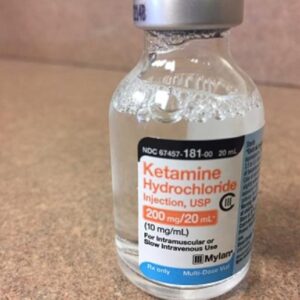Buy Ketamine Online
Doctors use Ketamine as general anesthesia to induce sleepiness or loss of consciousness. It is FDA-approved as a fast-acting anesthetic and dissociative medication in hospitals and clinics. Also used to treat mental health conditions like treatment-resistant depression, severe anxiety, and chronic pain under strict medical supervision.
In short, it induces a sleep-like state, while dissociative refers to the effect of feeling disconnected.
Ketamine works by acting on NMDA (N-methyl-D-aspartate) receptors in the brain, which are part of the glutamate system. This system is a main pathway for mood regulation, pain perception, and cognition.
Key Uses of Ketamine
- Used as general anesthesia in surgeries where full unconsciousness is required.
- Also used as a painkiller to treat acute and chronic pain, like post-surgical pain, complex regional pain syndrome.
- Used to treat Status Epilepticus(having seizures more than 5 minutes or lasting longer than 5 minutes)
- Ketamine is also used to treat some mental health conditions, like:
- Treatment-Resistant Depression (TRD)
- Bipolar Depression
- Post-Traumatic Stress Disorder (PTSD)
- Severe Anxiety
- Obsessive-Compulsive Disorder (OCD)
How Ketamine Benefits?
- Work as a strong antidepressant acts within an hour.
- Helps in reducing overthinking or suicidal thoughts.
- Gives you instant relief from after surgery or injury.
- Available in many formulations.
- It is safe for patients with cardiac arrest or respiratory issues.
- Also works if the antidepressant doesn’t.
Side Effects of Ketamine
Common side effects:
- Drowsiness
- Dizziness
- Nausea or vomiting
- Increased heart rate or blood pressure
- Blurred vision
- Dissociation (feeling disconnected from self/reality)
Serious or rare side effects:
- Hallucinations
- Anxiety or confusion
- Addiction or misuse potential
- Liver toxicity (with prolonged or high-dose use)
Dosage Guidelines for Ketamine
For Adult Anesthesia (IV/IM):
IV: 1–4.5 mg/kg
IM: 6.5–13 mg/kg
For Depression (under medical supervision):
IV infusion: 0.5 mg/kg over 40 minutes twice weekly
For Pain:
Low-dose infusion: 0.1–0.5 mg/kg/hour
It can also be given in oral or nasal form (off-label)
Warning and Precautions
- It should be taken only under strict medical supervision.
- Ketamine should not be given to a person who has a history of:
- Uncontrolled hypertension, active psychosis, or substance abuse
- Never use it recreationally as it carries serious risks like hallucinations, addiction, etc.
FAQs
Can Ketamine be taken at home?
No, it should be taken only under strict medical supervision.
Does Ketamine lead to dependency?
Yes, its recreational use can lead to habit forming.
Showing the single result
-
Ketamine 10mg
Price range: $230.00 through $1,050.00 Select options This product has multiple variants. The options may be chosen on the product page
Doctors use Ketamine as general anesthesia to induce sleepiness or loss of consciousness. It is FDA-approved as a fast-acting anesthetic and dissociative medication in hospitals and clinics. Also used to treat mental health conditions like treatment-resistant depression, severe anxiety, and chronic pain under strict medical supervision.
In short, it induces a sleep-like state, while dissociative refers to the effect of feeling disconnected.
Ketamine works by acting on NMDA (N-methyl-D-aspartate) receptors in the brain, which are part of the glutamate system. This system is a main pathway for mood regulation, pain perception, and cognition.
Key Uses of Ketamine
- Used as general anesthesia in surgeries where full unconsciousness is required.
- Also used as a painkiller to treat acute and chronic pain, like post-surgical pain, complex regional pain syndrome.
- Used to treat Status Epilepticus(having seizures more than 5 minutes or lasting longer than 5 minutes)
- Ketamine is also used to treat some mental health conditions, like:
- Treatment-Resistant Depression (TRD)
- Bipolar Depression
- Post-Traumatic Stress Disorder (PTSD)
- Severe Anxiety
- Obsessive-Compulsive Disorder (OCD)
How Ketamine Benefits?
- Work as a strong antidepressant acts within an hour.
- Helps in reducing overthinking or suicidal thoughts.
- Gives you instant relief from after surgery or injury.
- Available in many formulations.
- It is safe for patients with cardiac arrest or respiratory issues.
- Also works if the antidepressant doesn’t.
Side Effects of Ketamine
Common side effects:
- Drowsiness
- Dizziness
- Nausea or vomiting
- Increased heart rate or blood pressure
- Blurred vision
- Dissociation (feeling disconnected from self/reality)
Serious or rare side effects:
- Hallucinations
- Anxiety or confusion
- Addiction or misuse potential
- Liver toxicity (with prolonged or high-dose use)
Dosage Guidelines for Ketamine
For Adult Anesthesia (IV/IM):
IV: 1–4.5 mg/kg
IM: 6.5–13 mg/kg
For Depression (under medical supervision):
IV infusion: 0.5 mg/kg over 40 minutes twice weekly
For Pain:
Low-dose infusion: 0.1–0.5 mg/kg/hour
It can also be given in oral or nasal form (off-label)
Warning and Precautions
- It should be taken only under strict medical supervision.
- Ketamine should not be given to a person who has a history of:
- Uncontrolled hypertension, active psychosis, or substance abuse
- Never use it recreationally as it carries serious risks like hallucinations, addiction, etc.
FAQs
Can Ketamine be taken at home?
No, it should be taken only under strict medical supervision.
Does Ketamine lead to dependency?
Yes, its recreational use can lead to habit forming.
